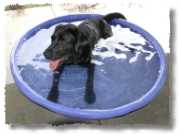
Heat Wave

 Drought - long-term lack of sufficient rainfall. It has no specific start, it slowly evolves and that is why there is not much to personally do for preparation. But, communities and state governments can and should prepare by putting water usage guidelines in place and enforcing water restrictions during stretches of low rainfall.
Drought - long-term lack of sufficient rainfall. It has no specific start, it slowly evolves and that is why there is not much to personally do for preparation. But, communities and state governments can and should prepare by putting water usage guidelines in place and enforcing water restrictions during stretches of low rainfall.
On a personal level, the general conservation of water use is the best thing to do. Plan drought tolerant landscaping, take shorter showers, fill the dishwasher and clothes washer completely before running, water yards minimally and at the most efficient times of day, wash your car efficiently.
 Heat Wave
Heat Wave
A heat wave is just an extended period of exceptionally high temperature for a location. It's a simple thing and easy to ignore, not like a tornado or flood. That is why so many people are caught unprepared when a heat wave creeps up on them. About 175 people die from summer heat each year in the USA. In 1980's big U.S. heat wave, over 1200 people died. In 1995, Chicago lost 739 people in just a few days. In 2003, Europe's heat wave killed over 35,000 people. Annually in the U.S., heat kills more people than floods, earthquakes, lightning, tornados, and hurricanes combined.
Extreme heat poses a risk in many different ways. High heat coupled with high humitidy causes the human body to overheat since its natural evaporation of water through sweating is slowed down. High heat in a dry climate is much more tolerable because sweat evaporation helps cool the body. Other environmental conditions such as stagnant air, smog, and general poor air quality further increase the risk of a heat-related illness. Personal conditions such as your body structure, physical shape, age, ancestory, and normal environment determine your risk of being effected by high temperatures - someone from Houston can handle higher temperature and humidity than someone from Calgary for example.
Cities are the worst place to be during a heat wave. Reasons for higher risk from heat are:
- Smog and air pollution effect breathing
- Asphalt and concrete absorb the heat all day and slowly release it overnight causing more heat discomfort
- Crime rates increase during heat waves
- Close proximity to other people allows disease to spread quickly
Heat disasters will most likely become more and more common over time as the average temperature around the world rises. In the past 25 years, that average temperature has risen 1 degree Fahrenheit. Expanding cities, expanding populations, reduction of green cover all are contributing to the increased risk and we will see more heat related deaths in the coming years.
 Heat Illnesses
Heat Illnesses
As your body succumbs to the heat hazard, and your body temperature rises, the following symptoms will occur:
- Heat Cramps - when exerting your body you may experience muscle pains and spasms, often in the legs. Typically an early warning that your body is in trouble due to dehydration and you need to stop and address the problem. The cramps are caused to a depletion of water, salts, and minerals so resting and drinking water will help. A sports drink is an alternative.
- Heat Exhaustion - your body pushes blood flow to the skin in an effort to increase cooling because you are using up water through heavy sweating. This takes blood from your vital organs which causes a mild shock condition in which you may experience paleness, nausea, dizziness, fainting, and a temperature. This is a very serious situation requiring immediate rest and water in a cooler place.
- Heat Stroke - most severe and deadly heat illness. The key symptom is that they are hot and flushed but not sweating because they have run out of adequate sweat to cool their body. There may still be sweat on their skin, but no or very little new sweat is being produced. Other symptoms are unconsciousness, seizures, and delirium. The body temperature has reached 105F degrees. This is definitely a life-threatening emergency situation in which emergency medical services should be called immediately. The victim should be cooled off as quickly as possible using ice packs, cool water, fans, whatever is available.
People that are in poor physical shape, the elderly, small children, or are not used to hot environments are most susceptible to heat-related illness. You should evaluate your risks and prepare accordingly. The early signs of heat exhaustion will continue to progress to heat stroke if the victim does not recognize the problem and get treatment. Treatment may be simply retiring to a cool place, resting, and drinking water but that simple treatment is crucial.
 Before a Heat Wave
Before a Heat Wave
The most important planning step to take is to recognize the truth that high temperature events will occur and they are dangerous. You don't need a survival kit or special plans, but there are some preparations you can make to help minimize your exposure.
- Have your air conditioning system checked to ensure it won't let you down. Replace the filters regularly.
- Increase the insulation level of your home. Attic insulation will help keep your house cool.
- Seal cracks and gaps around windows and doors to keep cool air in.
- Install shades and drapes, especially on windows that receive morning and afternoon sun.
- Install awnings outside windows to provide shade.
- Leave your storm windows up for extra insulation.
- Plant shade trees where their shadows will help keep your home cool. This is a long-term item that will help years from now.
- Contact your neighbors to discuss preparation for heat waves and other disasters. Plan to contact each other every day during a heat wave to check that everyone is ok.
 During a Heat Wave
During a Heat Wave
It should be obvious that the most important thing to do is stay cool. And, that's not in the 'cool dude' meaning. That's literally keep your body temperature down by:
- Minimize physical exertion
- Drink water
- Stay in cool, dry locations
- If you must go outside, wear a wide-brim hat and sunscreen. Go outside early in the morning when it is coolest.
- Spend the day in an air-conditioned mall or YMCA or library if your home has no air conditioning.
- Drink more water than you think is necessary. You should urinate often as a sign that your body is fully hydrated.
- Do not drink alcohol.
- Wear light-weight and light-colored clothing to help reflect the sun's heat, reduce weight on your body, and aid in evaporation.
- Watch for warning signs such as headache and weariness.
- Do not take salt tablets unless instructed by your doctor.
- Eat cool food, not hot, heavy meals. Tuna salad or chicken salad sure sounds good!
- Be aware of your neighbors and check in with them periodically to make sure they are ok.
- Don't forget that pets are also effected by the heat and will need shade and extra water.
- Never, never, never leave children in a vehicle, whether or not there is a heat emergency.
- Reduce electricity use so more is available for air conditioning. During high heat, a power failure can be catastrophic to a community.
- Do not get sunburned. Sunburned skin is much less efficient at releasing heat from your body.
A good trick to help keep your house cool during a heat wave is to cut pieces of cardboard the size of each window. Wrap the cardboard in aluminum foil and then set it in place against the window. This will reflect heat back outside the house and is a cheap bit of help.
 Hot Cars on Hot Days
Hot Cars on Hot Days
If you have ever left a person or a pet in a car, you should read this.
General Motors of Canada funded a study and determined that a car parked in the sun on a 95F degree day would have an inside temperature of over 120F within 20 minutes. And, in 40 minutes it would be over 150F. This was a small car that had the air conditioning going before stopping.
Heatstroke occurs when a person's core temperature reaches 105F. The smaller the person, the more quickly the heat can raise their temperature, causing death. That means leaving your child in a carseat for even less than 20 minutes may kill the child - even if it is only 5 or 10 minutes, heatstroke is a possibility.
Don't fool yourself into thinking that there will be no problem on cooler days. Cars are insulated ovens and even on moderately warm days can have an inside temperature 50 degrees or more higher than the outside in just a half hour.
Don't fool yourself into thinking that leaving the windows opened an inch will help. Studies have shown that the temperature still soars and reaches deadly levels at nearly the same rate.
An average of 30 children a year die in the U.S. trapped in their carseats sitting and waiting for mom or dad. That has to be one of the saddest statistics ever. Love your kid enough to bring him with you from the car or leave another adult with him. And, love your pet enough to leave it home if you can't leave someone with it in the car.

Find Emergency and Disaster Info at EmergencyDude.com
